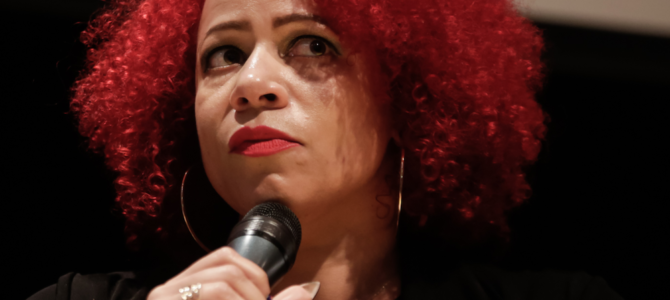When a pundit argued in June that America’s recent chaos should be called the “1619 Riots” after the New York Times’ ahistorical 1619 Project, 1619 writer Nikole Hannah-Jones responded, “It would be an honor.” The project, for which Hannah-Jones’ essay won her a Pulitzer Prize, defines America’s founding as the year Europeans first brought enslaved Africans to America.
Hannah-Jones’ eagerness to be credited with inspiring looting, arson, and multiple homicides might seem surprising. Considering the 1619 Project, it is not. Americans currently celebrate 1776 as a year of strength, when we cut ties with imperial Britain and declared our independence. Hannah-Jones wants to replace that and celebrate a year of black enslavement instead.
Defining one’s cultural identity with a centuries-old year of disaster is odd but not unprecedented. It happened in Yugoslavia a generation ago. The year of celebration was 1389, and its advocate was Serbia’s Slobodan Milošević.
Milošević was an anonymous political functionary until 1987, when he orchestrated a riot between Serb demonstrators and Albanian police in Kosovo. Milošević then walked into the mayhem and told the Serbs, “No one will dare to beat you again!”
This appeal to ethnic pride made Milošević a hero among Serbs, who felt stifled by a Yugoslavian communist political system that intentionally underrepresented them. Serb grievances extended further, however, back to the 1389 Battle of Kosovo Polje, where the Ottoman Empire conquered Serbia en route to establishing a nearly 500-year Muslim dominance of the Balkans. At Kosovo Polje, the Serbs, in Milošević’s words, “fell into slavery.”
Milošević constantly referred to 1389. He showcased the remains of Prince Lazar Hrebeljanović, martyred at Kosovo Polje, throughout Serbia. He delivered a speech on Kosovo Polje’s 600th anniversary in front of a sign reading “1389-1989,” in which he mentioned the possibility of future “armed battles.” Since Milošević had a habit of rallying mobs to intimidate rival politicians into doing his bidding, future armed battles seemed likely.
Milošević’s combination of inflaming centuries-old grievances and inciting mob rule should sound familiar. American journalists and politicians have been doing it this summer, and the specific years of emphasis are illuminating.
1619 and 1389, from their own cheerers’ perspectives, commemorate horrors leading to centuries of subjugation and enslavement. They are not mementos of pride. They are moral cudgels against perceived ethnic opponents, and they can — as Hannah-Jones has shown — justify violence and murder. In short, they inspire vengeance.
When Milošević threatened vengeance in Yugoslavia, Serbia’s perceived ethnic opponents reacted according to their own agendas. Slovenia and Croatia declared independence in 1991. Slovenia won independence quickly. Croatia did so after a war featuring 20,000 combat deaths that only ended with the forcible expulsion of hundreds of thousands of Serb residents.
An even more brutal fate awaited multiethnic Bosnia, which declared independence behind a Muslim-Croat voting alliance. Muslims were Bosnia’s largest cultural group, at 43.5 percent, and had been its highest-social-status ethnicity since the Ottoman conquest centuries earlier.
American journalist Peter Maass called Muslims the “privileged” and “elite” of Bosnia. Serb extremists, directed by Milošević and motivated by vengeance for the 1389 Ottoman Muslim conquest, subjected Bosnia’s Muslims to more than three years of mass rape, mass murder, and ethnic cleansing, culminating in the 1995 genocide at Srebrenica.
America in 2020, like Yugoslavia in the 1980s, is multiethnic. Contrary to Hannah-Jones’ declaration, inciting riots by stoking past tensions, and using misinformation to do so, is not “an honor.” The Milošević model of inflaming ancient hatreds and inciting mob rule is leading us down a dark path.









